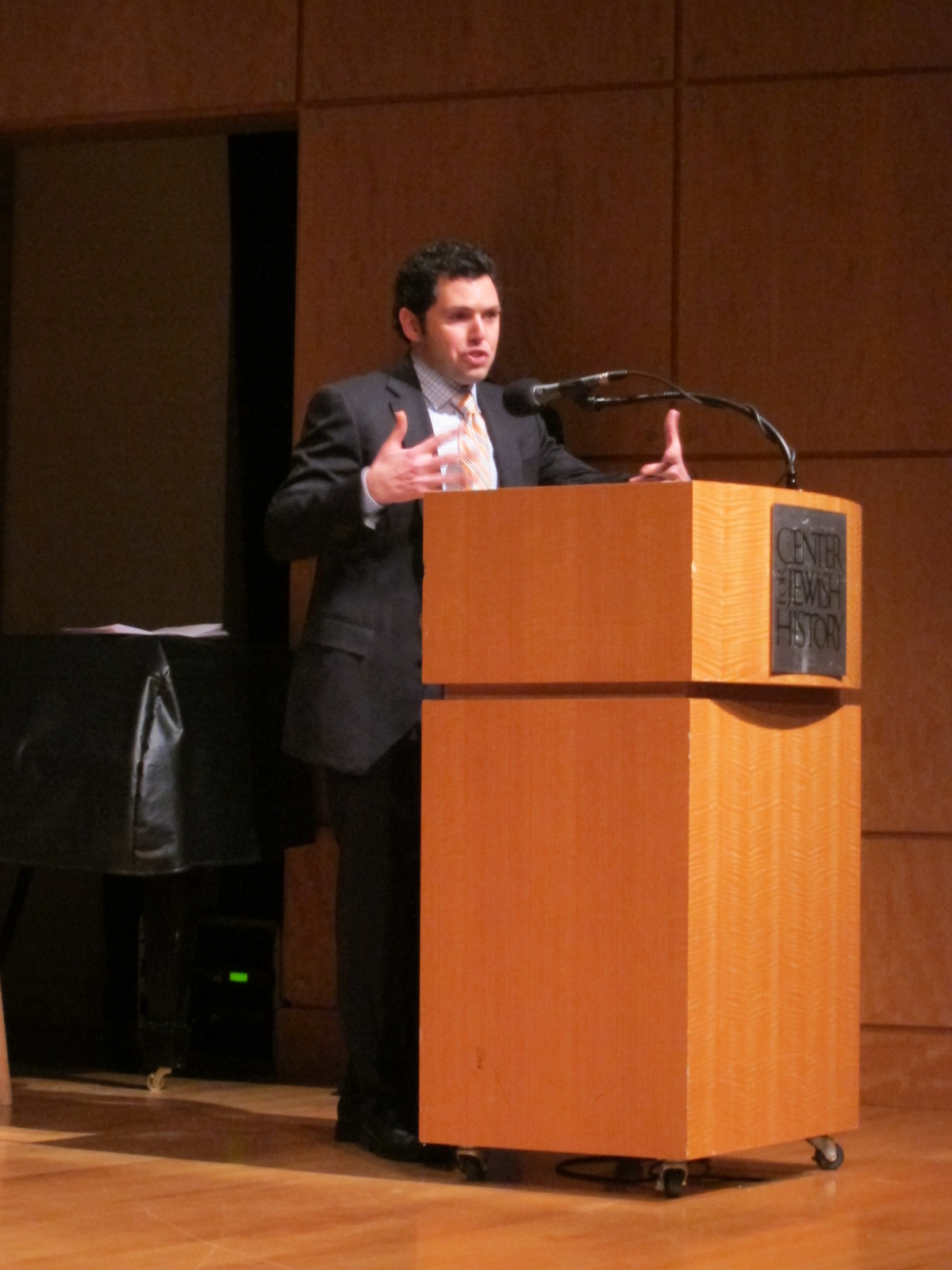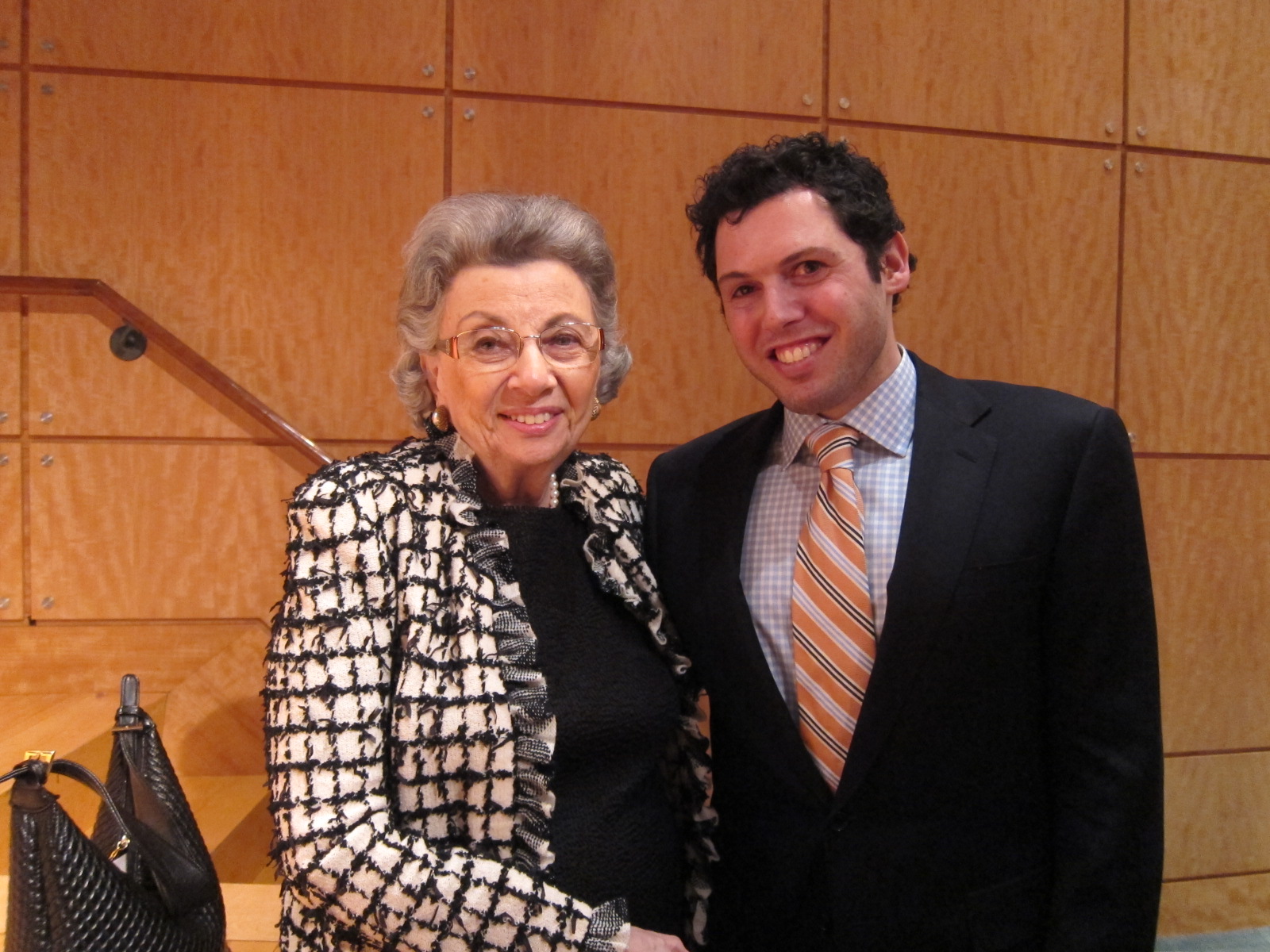Join a community of readers who are committed to Jewish stories
Sign up for JBC’s Nu Reads, a curated selection of Jewish books delivered straight to your door!
On Wednesday, March 9th, Gal Beckerman accepted the 2010 Jewish Book of the Year Award for When They Come for Us, We’ll Be Gone: The Epic Struggle to Save Soviet Jewry. His ceremony remarks follow:
 I’m extremely humbled to have won this award. I truly can’t think of a greater honor than to receive a prize that so many giants have received before me – Amoz Oz, Michael Oren, Jonathan Sarna, Joseph Telushkin, to name just a few. On top of that, to be here on the same evening that we honor the legendary Cynthia Ozick, is just truly more than I could have ever hoped for.
I’m extremely humbled to have won this award. I truly can’t think of a greater honor than to receive a prize that so many giants have received before me – Amoz Oz, Michael Oren, Jonathan Sarna, Joseph Telushkin, to name just a few. On top of that, to be here on the same evening that we honor the legendary Cynthia Ozick, is just truly more than I could have ever hoped for.
The last time I can remember feeling so completely humbled had to be when I walked into Houghton Mifflin’s offices for the first time in 2004 to meet with an editor who was interested in the book. I was 27 and very nervous and so I dressed in a suit, trying to look as serious as possible. The editor, Jane Rosenman, kind of sized me up, looking me up and down, and finally said, “You look so young. I bet the last time you wore that suit was your Bar Mitzvah.”
Hopefully I’ve made a little progress since then.
It’s actually very special for me that Cynthia Ozick should be here. I used a wonderful metaphor of hers for the book’s epigraph and it’s one I’d like to discuss a bit this evening. The line is about a shofar and it comes from a 1970 essay she wrote about the need for Jewish writers in America to draw on their own tradition for inspiration. This is what she wrote: “If we blow into the narrow end of the shofar, we will be heard far. But if we choose to be Mankind rather than Jewish and blow into the wide part, we will not be heard at all; for us, America will have been in vain.”
It’s an image that also helps explain a lot about the Soviet Jewry movement and why it had such a profound affect on American Jews. To borrow her metaphor, my book is the history of this community learning for the first time just how far they could be heard if the blew out of the narrow end of the shofar.
Put another way, it’s a story of recalibration. American Jewish identity has always been a struggle between, on the one hand, a commitment to universal, humanistic, deeply-held American values and on the other, a pull towards a tribal, particularistic, Jewish identity. The movement balanced these two allegiances better than at any other moment in our history.
We learned that by blowing out of the narrow end of the shofar, we could more effectively express our hopes for humankind — that being American, fully American, did not mean subsuming the particular to the universal, but using the particular to make the universal sing. The result was not just the freedom of fellow Jews who were in need of help. Through their activism, American Jews put human rights at the center of American foreign policy – a legacy we still feel today.
The beauty of the movement – and the one element, more than any other, that led to its success and, personally, allowed it to sustain my interest all these years – was its power to bridge so many divides. This was a movement embraced as both an anti-Communist cause by those on the right and a human rights struggle for those on the left. It was a priority of Carter’s no less than of Reagan’s. A very broad swathe of people marched under the banner of the Soviet Jewry movement, a banner that I sometimes like to say was pulled taut between two poles, with Meir Kahane, the extremist right-wing rabbi who was the very paragon of Jewish tribalism gone awry, holding up one, and Andrei Sakharov, the great Soviet democracy activist, holding up the other.
In February 1986 – 25 years ago last month – when Anatoly Sharansky, a fighter both for Soviet Jewry and human rights, finally walked to freedom after nine years in Soviet prisons, there was much anxiety about what his ideological orientation might be once he was in the West. His wife Avital, who had tirelessly campaigned on his behalf all those years, had become very close with the right-wing religious settler movement, Gush Emunim, and many people wondered how Sharansky would possibly reconcile this with his identity as a human rights activist. A journalist posed the question to Yehuda Amichai, Israel’s greatest poet, and he had a telling answer. “I hope they don’t ruin him,” he said. “He’s the last one who belongs to all of us.”
This was indeed a movement that belonged to all of us. But was it the last? Do Jews have anything like this today? It’s a question I get asked almost every time I talk about the book to Jewish audiences. And the truth is that I don’t think we do. Israel certainly doesn’t serve this unifying purpose. The same interests that overlapped so harmoniously on Soviet Jewry are vehemently opposed to one another when it comes to Israel. There are some Jews today who hear the words “human rights” and assume it must be some veiled threat against the Jewish state. And on the other side, there are those who see in Israel a nefarious force, enthralled only to its worst angels and incapable of acting for the good of the world.
I feel a deep sadness whenever I tried to compare the clarity of purpose that must have accompanied being a part of a cause like Soviet Jewry with the kinds of hard choices and often compromises young American Jews feel they have to navigate today when they decide to have some kind of active Jewish identity.
What I tell those people who ask me about replicating the movement is that I’m not sure its possible. There was so much about the historical context, about the particularities of the Cold War itself, which also helped account for its success. But what I can do is identify what worked without trying to prescribe how it might work again.
I can say that understanding which end of the shofar to blow out of certainly was crucial – tapping into the history, culture and humanistic values of Judaism gave the community the backbone it needed to try and alter history.
But it was equally important that this movement worked towards goals that were indisputably good not just for Jews, but for all people, goals that were in the end about getting the Soviet Union to respect basic human rights. As a human right, freedom of movement is, after all, always the first step to bringing down any totalitarian society. When you can leave, you can vote with your feet.
 There is reason to be hopeful in just knowing that that such a movement happened, that these disparate elements came together, that the universal and particular overlapped in this special way, and it means that the potential exists for it to happen again.
There is reason to be hopeful in just knowing that that such a movement happened, that these disparate elements came together, that the universal and particular overlapped in this special way, and it means that the potential exists for it to happen again.
But first we have to escape from a Jewish parochialism that blinds us to the rest of the world. And at the same time, we have to abandon the unrealistic – however laudable – notion that we can be a light unto the nations. Between these two, is where I believe the potential exists: that we can achieve a good that not only helps ourselves as Jews, as members of a tribe, but that also changes humanity for the better.
If there is one big lesson then that I learned about my own people from writing this book, it is that this potential, though too often squandered, is in the end our greatest strength.
I’ve been told to avoid thank yous, which is actually a very hard thing to do on a day like today when I feel so grateful to the help and support of so many people who have believed in me and this project for so long. Suffice it to say then that to those people – and you know who you are – I could not have done this without you.
Thank you.
Gal Beckerman is a staff writer at The Atlantic and the author of The Quiet Before: On the Unexpected Origins of Radical Ideas, a New York Times notable book, and When They Come for Us, We’ll Be Gone: The Epic Struggle to Save Soviet Jewry, which won the National Jewish Book Award. His writing has appeared in The New York Times, The Washington Post, and many other publications. He has a PhD from Columbia University and lives in Brooklyn, New York.